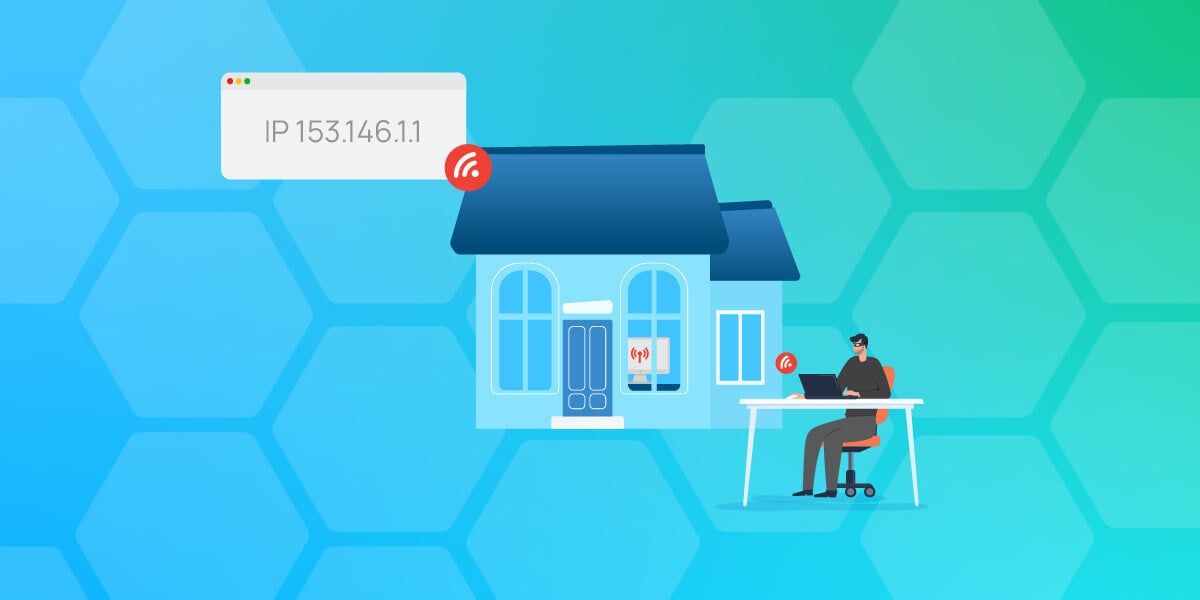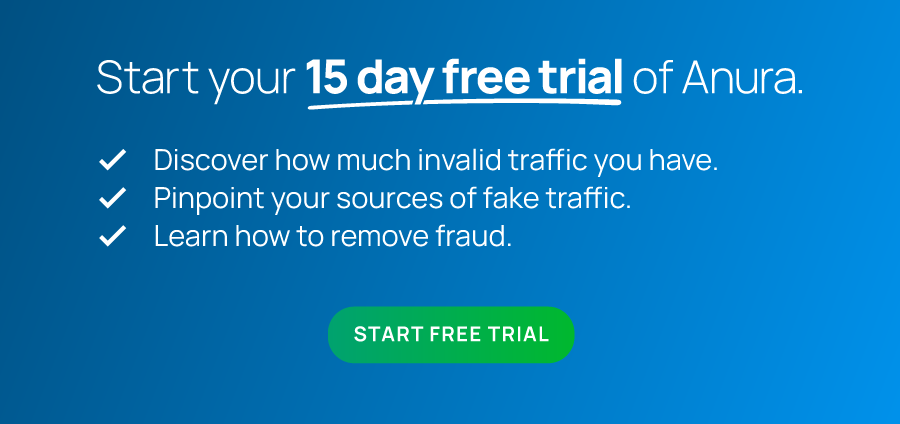Residential Proxies: Unmasking the Hidden Threat to Your Marketing

TL;DR
- Residential proxies route internet traffic through real devices, masking IP addresses.
- Fraudsters exploit residential proxies for ad fraud, web scraping, and product scalping.
- Rotating residential proxies makes traditional IP blocking ineffective.
- Real-time ad fraud solutions that track environmental anomalies protect campaigns from fraudulent traffic.
Residential Proxies and How They Work
Running a successful online marketing campaign is challenging enough without having to fight fraudsters. The biggest issue with ad fraud isn't just the money it drains from your budget; it's that fraudsters constantly adapt, using new tools and techniques to evade detection.
One of the most common tools they rely on today is the residential proxy.
But what is a residential proxy, and how does it work?
A residential proxy acts as an intermediary server that routes internet traffic through a real device connected to a consumer’s internet provider. Instead of showing the user's true IP address, the proxy forwards the request through a legitimate residential IP. To the destination website, traffic appears to be coming from an everyday user, not a bot, scraper, or fraudster.
This makes residential proxy networks highly effective at masking the origin of internet traffic. Unlike proxies tied to data centers, which can often be flagged as suspicious, residential proxy services use IPs from households, making them appear trustworthy. Fraudsters exploit this to disguise bot traffic, bypass IP blocks, and make fraudulent activity blend in with everyday users.
For advertisers, this creates a serious problem. Residential proxies allow fraudsters to carry out ad fraud, web scraping, or product scalping without detection, turning once-reliable defenses like IP blacklists into weak tools that block legitimate users as often as they block criminals. That's why businesses need more than basic IP-based protections. They need solutions that can analyze multiple signals at once to tell the difference between genuine customers and fraudulent proxy traffic.
How Are Residential Proxies Used?
Residential proxies can be used in both legitimate and illegitimate ways.
Legitimate Uses of Residential Proxies:
- Ad Placement Testing: Advertisers use residential proxy services to confirm that ads are displayed correctly across regions and devices. By routing traffic through a residential IP, they can see ads as a real consumer would and block suspicious placements.
- Cybersecurity Testing: Security firms often use residential proxy networks during penetration tests to mimic real-world attacks. This helps them evaluate how well firewalls, IDS systems, and other defenses hold up under authentic-looking traffic.
- Bypassing Content Restrictions: Some consumers use residential proxies or VPNs to access region-locked content on streaming platforms. By appearing to connect from another country, they bypass local restrictions.
Illegitimate Uses of Residential Proxies:
- Disguising Bot Traffic: Fraudsters hide their bots behind residential IPs, making traffic appear legitimate.
- Web Scraping: Bots powered by rotating residential proxies scrape websites for pricing, content, or code. With constantly changing IPs, they can avoid detection while stealing data.
- Scalping Products: Ticket scalpers and resellers use proxy networks to flood online stores with purchase requests. By rotating through thousands of IPs, bots slip past IP-based blocking and buy up stock.
- Ad Fraud: Fraudsters use residential proxies to generate fake clicks, form fills, and impressions. By spreading fraudulent traffic across thousands of residential IPs, they make it nearly impossible to spot the fraud based on IP addresses alone.
How Do Proxy Services Get Access to Real Residential IP Addresses?
Everyone likes the idea of “free,” but when it comes to residential proxy services, there’s always a hidden cost. One of the most common ways providers build a residential proxy network is by offering consumers a free app or software.
When someone installs that app onto their computer, phone, or other smart device, the provider gains permission to route other customers’ internet traffic through that person’s network. In effect, the consumer’s device becomes part of a larger proxy network. From the outside, any traffic that passes through looks like it’s coming from a legitimate household, even though it might belong to an unknown third party.
Whether consumers fully understand this depends on the provider. Some disclose upfront that their residential proxy services turn devices into relay points. Others bury the details in their “Terms of Service,” while a few fail to mention it at all. That means users may unknowingly host someone else’s activity and risk having it traced back to them.
By contrast, non-residential proxies and VPNs usually operate through centralized data centers built to handle large volumes of anonymized traffic. These services tend to charge a fee, but they don’t rely on commandeering consumer devices to create a network of IP addresses.
This distinction is important: while residential proxy networks offer IPs that appear more trustworthy, the way they’re built often raises ethical and security concerns, especially when users don’t know they’re part of the system.
The Problem with Residential Proxies: Ad Fraud and IP Blocking
The danger of residential proxies is that they make fraudulent traffic look legitimate. Fraudsters can hide behind real household IPs just long enough to profit from fake clicks, impressions, or leads.
The bigger issue? They render IP blocking almost useless. Block one IP, and a residential proxy network simply assigns the fraudster another. Meanwhile, you risk shutting out real consumers whose devices share that IP address, sometimes entire apartment buildings or businesses.
In short, relying on IP blocking to fight ad fraud can backfire, costing companies both money and real customers.
Fight Residential Proxy Abuse with an Ad Fraud Solution
Since IP blocking can’t stop fraudsters using residential proxy networks, you need smarter protection. A true ad fraud solution looks beyond IP addresses, analyzing hundreds of data points to separate real users from fake traffic in real time.
Anura delivers exactly that, with a 99.999% accuracy guarantee when flagging fraudulent visitors. The result: no wasted spend, higher ROI, and peace of mind that your ads are only reaching real people.
Stop fraud before it drains your budget. Reach out today to get started!
FAQ
What are the most common types of ad fraud associated with residential proxies?
Residential proxies can be used in several types of ad fraud, including click fraud, impression fraud, and affiliate fraud.
How do residential proxies differ from datacenter proxies?
Residential proxies are IP addresses provided by internet service providers to homeowners and are linked to actual devices in homes, making them appear more legitimate. This credibility can make it harder for ad fraud detection systems to flag them as suspicious. On the other hand, data center proxies are hosted in data centers and are associated with non-residential IP addresses. These are easier to detect and block because they often come from large blocks of IPs that are known to be associated with data centers.
Can residential proxies affect the accuracy of geo-targeting in digital campaigns?
Since the traffic appears to come from the IP location of the residential proxy rather than the user's actual location, campaigns can end up being displayed to users in completely different geographical areas. This misdirection can lead to wasted ad spend and missed opportunities to engage with your target audience.
How can businesses detect and prevent 'proxy farms' from skewing their digital analytics?
Proxy farms, which utilize large numbers of proxies to create or mimic internet traffic, can be detected through behavioral analytics and pattern recognition. Anomalies such as unnatural spikes in traffic from similar IP ranges or geographic inconsistencies in traffic sources are common red flags.
What steps should I take if I detect ad fraud from residential proxies?
Once ad fraud is detected, you should first assess the scope and impact of the fraud. Then, block the IP addresses associated with the fraudulent activities, adjust your ad strategies to mitigate future risks, and consider legal actions if necessary.
Additionally, sharing information about fraud patterns with industry bodies can help improve overall defenses against ad fraud.
What’s the difference between residential proxies and VPNs?
While both hide a user’s IP address, VPNs typically route traffic through centralized servers or data centers. Residential proxies, by contract, use IPs from real households, making them appear more authentic to websites.

